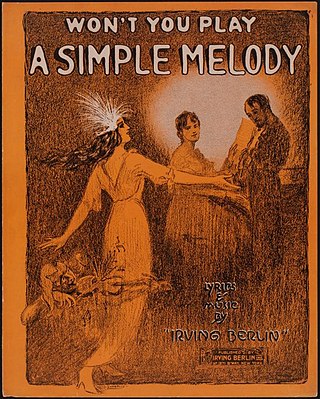
"Play a Simple Melody" is a song from the 1914 musical, Watch Your Step, with words and music by Irving Berlin. The show was the first stage musical that Berlin wrote. It ran for 175 performances at the New Amsterdam Theater in New York City. The one song from the show that is well-remembered today is "Play a Simple Melody," one of the few true examples of counterpoint in American popular music — a melody running against a second melody, each with independent lyrics. In the printed music, first the "simple melody" plays alone. Then comes the contrasting melody. Finally, the two play together. The lyrics of "Play a Simple Melody" also track the counterpoint duet in that one singer yearns for the music which mother sang, but the other singer disdains such classic fare as lacking interest and rhythm. When "Play a Simple Melody" was published, ragtime was in its heyday, led by its most consummate composer, Scott Joplin. In a famous 1916 recording of the song, while Elsie Baker wants what she considers simplicity, Billy Murray explicitly asks for "rag". The song was also recorded by Walter Van Brunt and Mary Carson in 1915.
This is a list of notable events in country music that took place in the year 1943.

"I'm Always Chasing Rainbows" is a popular Vaudeville song. The music is credited to Harry Carroll, but the melody is adapted from Fantaisie-Impromptu by Frédéric Chopin. The lyrics were written by Joseph McCarthy, and the song was published in 1917. It was introduced in the Broadway show Oh, Look! which opened in March 1918. The song was sung in the show by the Dolly Sisters. Judy Garland sang it in the 1941 film Ziegfeld Girl. It was subsequently sung by Jack Oakie in the 1944 film The Merry Monahans and was again featured in the 1945 film The Dolly Sisters, where it was sung by John Payne. It was also included for part of the run of the 1973 revival of Irene. Additionally, the pre-chorus would not have been included until later covers in the 1940s, where the song would gain it's iconic libretti.
For music from an individual year in the 1940s, go to 40 | 41 | 42 | 43 | 44 | 45 | 46 | 47 | 48 | 49

The Bing Crosby Show for Chesterfield was a 30-minute musical variety old-time radio program starring entertainer Bing Crosby. The series ran on CBS Radio from 1949–1952.
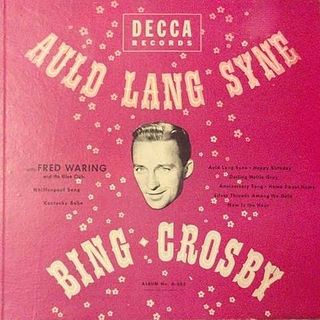
Auld Lang Syne is a compilation album of phonograph records by Bing Crosby released in 1948 featuring songs that were sung by Crosby and also by Fred Waring and his Glee Club. The songs were later presented in 33 1/3 rpm and 45 rpm sets, respectively. This set featured many of Bing's great hits such as: Silver Threads Among the Gold and Now Is the Hour.

St. Patrick's Day is a compilation album of phonograph records by Bing Crosby released in 1947 featuring songs with an Irish theme. This includes one of Crosby's most-beloved songs, "Too-Ra-Loo-Ra-Loo-Ral" which was number four on the Billboard Hot 100 for 12 weeks, and topped the Australian charts for an entire month, on shellac disc record. This version, the 1945 re-recording, was released earlier in another Crosby album, Selections from Going My Way.

Favorite Hawaiian Songs, Volume One is a compilation album of phonograph records by Bing Crosby released in 1946 featuring songs that were sung in a Hawaiian-type genre. This was the fourth Hawaiian-themed album release for Crosby.

Favorite Hawaiian Songs, Volume Two is a compilation album of phonograph records by Bing Crosby released in 1946 featuring songs that were sung in a Hawaiian-type genre. This was the fifth Hawaiian-themed album release for Crosby.
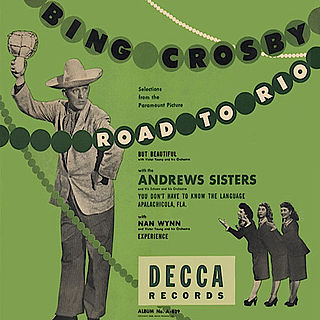
Selections from Road to Rio is a studio album of phonograph records by Bing Crosby and The Andrews Sisters released in 1948 featuring songs that were presented in the American comedy film Road to Rio.

Don't Fence Me In is a compilation album of phonograph records by Bing Crosby and The Andrews Sisters released in 1946 featuring Country and Western songs. This album contained the enormously popular record "Pistol Packin' Mama", which sold over a million copies and became the first number one hit on the then-new Juke Box Folk Song Records Chart that was later renamed the Hot Country Songs Chart.

The Happy Prince is a studio album of phonograph records by Bing Crosby and Orson Welles of the Oscar Wilde short story The Happy Prince.
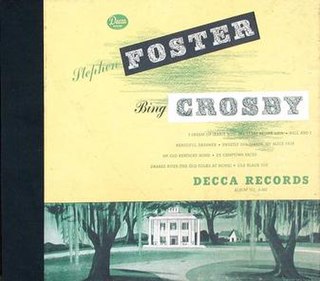
Stephen Foster is a compilation album of phonograph records by Bing Crosby of songs by Stephen Foster released in 1946.

St. Valentine's Day is a 1948 Decca Records compilation album of recordings by Bing Crosby.

Bing Crosby Sings with Judy Garland, Mary Martin, Johnny Mercer is a Decca Records compilation album of phonograph records by Bing Crosby, Judy Garland, Mary Martin and Johnny Mercer.

Bing Crosby Sings with Lionel Hampton, Eddie Heywood, Louis Jordan is a Decca Records compilation album of phonograph records by Bing Crosby, Lionel Hampton, Eddie Heywood and Louis Jordan.

Top o' the Morning / Emperor Waltz is a Decca Records studio album of phonograph records by Bing Crosby of songs from his movies Top o' the Morning and The Emperor Waltz, catalog number DL 5272.

Songs from Mr. Music is a Decca Records studio 78rpm album of phonograph records by Bing Crosby, The Andrews Sisters and Dorothy Kirsten of songs from the film Mr. Music.
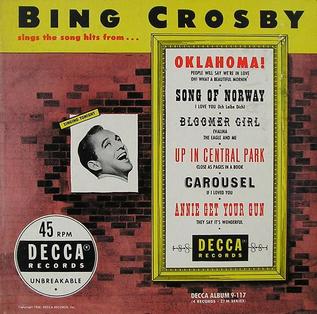
Bing Crosby Sings the Song Hits from Broadway Shows is a Decca Records compilation 78rpm album of phonograph records by Bing Crosby featuring some of the hits from Broadway musicals.

Bing Crosby Sings Cole Porter Songs is a Decca Records studio 78rpm album of phonograph records by Bing Crosby featuring the songs of Cole Porter.


















